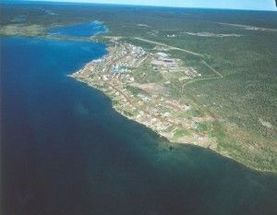Déline, Northwest Territories

Year(s) Funded: 2009-2010
Topic Area: Knowledge Sharing / Education Contact:Deborah Simmons, Assistant Professor, Native Studies, University of Manitoba ([email protected]) Partners: Deline Renewable Resource Council & University of Manitoba Title: Health Risk and Climate Change in Sahtúot’ine Stories: Envisioning Adaptions with Elders and Youth in Déline, NWT
Action: In the early part of the 1900s, Déline prophet Ɂehtséo Ayha warned of drastic environmental and social changes to come in the future, and the Déline community has been working to monitor the truth of those predictions. To establish the foundation for health programs that proactively address climate change, research explored the renewal of storytelling practices with a focus on elder-youth exchanges about health and climate change. There is a belief that stories can help to strengthen relationships with the land, and give new meaning to the skills and knowledge required to maintain good health in a changing environment. Work was done in three contexts: on the land, in the community, and in the school. The objective was to learn how youth can prepare for future leadership in climate change adaptation by taking ownership of their heritage in stories. The study explored the special skills that youth bring to the representation of stories using social media. Research revolved around six key activities, with story exchanges at the core of each: a climate history and monitoring project that allowed Elders and youth to engage with climate scientists, considering the new and old skills and knowledge needed for safe travel on the land as the climate changes; a project to establish databases in Dene terminology and stories about health, place and climate/weather; a mapping project to understand the cultural and ecological history of landscape around Sahtú; a series of exchanges on traditional healing and responses to new health risks; the “Sharing Our Stories” project, which explored different ways of sharing and performing stories in the school and in the community in a variety of social media tools; and a project to understand the ongoing strengths in subsistence harvesting as the environment changes. Results: The study identified key stories the Elders feel are important for youth to know and be able to apply in their lives. These were stories of place that span the formation of the landscape by Yamoria, and the more recent history of environmental and social changes brought by the Port Radium uranium mine. Much was learned about youth perspectives on their land and heritage through the stories that they created through the various workshops. Youth gained capacity in digital storytelling, radio documentary, and digital mapping that can be used to keep the stories alive and the community began to explore the challenges of bringing stories into a policy context in self-government and land stewardship. The Délıne Learning About Changes study shed light on the complex combination of cultural practices that Sahtúot’ıne see positively as a way of life, a basis for well-being. The study opened up new spaces for Elders, adults and youth to start a dialogue about the nature of changes being experienced on the land and the possible health risks that are coming with these changes. Outputs: Several products were produced as a result of this project: Sobake Ɂetené radio documentary, Délı̨nę Youth Digital Stories collection, Ɂehts’ulah CD, a placenames database, a dictionary database, and an oral history database. Additional Resources & Publications
|
